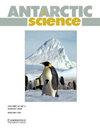Researchers on ice? How the COVID-19 pandemic has impacted Antarctic researchers
IF 2
4区 地球科学
Q3 ENVIRONMENTAL SCIENCES
引用次数: 1
Abstract
Abstract The COVID-19 pandemic and pandemic-related measures have impacted the lives and work-related activities of Antarctic researchers. To explore these impacts, we designed, piloted and disseminated an online survey in English, Russian, Spanish and Chinese in late 2020 and early 2021. The survey explored how the pandemic affected the productivity of Antarctic researchers, their career prospects and their mental wellbeing. Findings exposed patterns of inequities. For instance, of the 406 unique responses to the survey, women appeared to have been affected more adversely than men, especially in relation to mental health, and early-career researchers were disadvantaged more than their mid- or late-career colleagues. Overall, a third of the research participants reported at least one major negative impact from the pandemic on their mental health. Approximately half of the participants also mentioned that the COVID-19 pandemic had some positive effects, especially in terms of the advantages that working from home brought and opportunities to attend events, network or benefit from training workshops online. We conclude with a series of recommendations for science administrators and policymakers to mitigate the most serious adverse impacts of the pandemic on Antarctic research communities, with implications for other contexts where scientific activities are conducted under extreme circumstances.研究人员在冰上?新冠肺炎大流行对南极研究人员的影响
新冠肺炎疫情及其相关措施对南极科研人员的生活和工作活动造成了影响。为了探索这些影响,我们在2020年底和2021年初设计、试点和传播了一项在线调查,使用英语、俄语、西班牙语和中文。这项调查探讨了疫情如何影响南极研究人员的生产力、他们的职业前景和心理健康。调查结果揭示了不平等的模式。例如,在调查的406个独特回复中,女性似乎比男性受到更不利的影响,特别是在心理健康方面,早期职业研究人员比他们的中后期同事更处于不利地位。总体而言,三分之一的研究参与者报告说,疫情对他们的心理健康至少产生了一项重大负面影响。大约一半的参与者还提到,COVID-19大流行产生了一些积极影响,特别是在在家工作带来的优势以及参加活动、建立网络或从在线培训研讨会中受益的机会方面。最后,我们向科学管理人员和决策者提出了一系列建议,以减轻这一流行病对南极研究界的最严重不利影响,并对在极端情况下开展科学活动的其他情况产生影响。
本文章由计算机程序翻译,如有差异,请以英文原文为准。
求助全文
约1分钟内获得全文
求助全文
来源期刊

Antarctic Science
地学-地球科学综合
CiteScore
3.60
自引率
6.20%
发文量
42
审稿时长
3 months
期刊介绍:
Antarctic Science provides a truly international forum for the broad spread of studies that increasingly characterise scientific research in the Antarctic. Whilst emphasising interdisciplinary work, the journal publishes papers from environmental management to biodiversity, from volcanoes to icebergs, and from oceanography to the upper atmosphere. No other journal covers such a wide range of Antarctic scientific studies. The journal attracts papers from all countries currently undertaking Antarctic research. It publishes both review and data papers with no limits on length, two-page short notes on technical developments and recent discoveries, and book reviews. These, together with an editorial discussing broader aspects of science, provide a rich and varied mixture of items to interest researchers in all areas of science. There are no page charges, or charges for colour, to authors publishing in the Journal. One issue each year is normally devoted to a specific theme or papers from a major meeting.
 求助内容:
求助内容: 应助结果提醒方式:
应助结果提醒方式:


